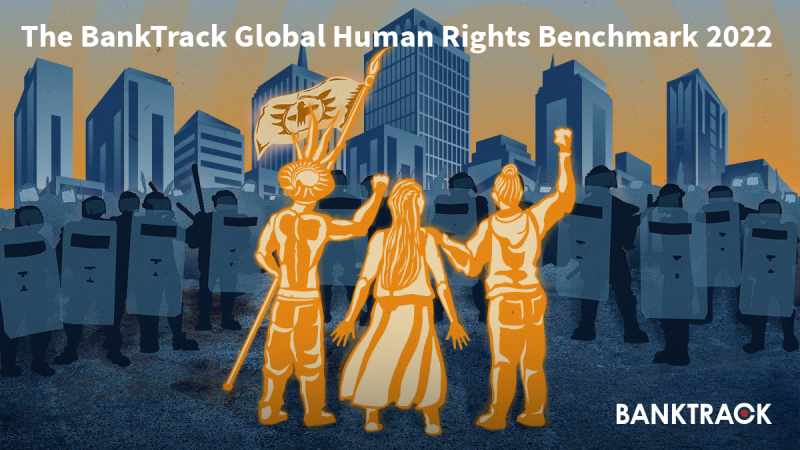Investors with US$861 billion in assets under management and advisement support findings of BankTrack’s 2022 Global Human Rights Benchmark

A group of 47 investors representing US$861 billion in assets under management and advisement, coordinated by the Investor Alliance for Human Rights, has signed a statement in support of BankTrack’s 2022 Global Human Rights Benchmark. The statement expresses concern regarding the human rights performance of banks as shown by the Benchmark’s findings, and calls on banks to “raise the ambition and increase the pace” of implementation of the Guiding Principles, as the UN has called for in its Roadmap for the Next Decade.
The Benchmark evaluated the disclosures of 50 of the world’s largest banks against a set of 14 criteria covering four key areas of the UN Guiding Principles on Business and Human Rights (UNGPs): (1) policy commitment, (2) human rights due diligence, (3) reporting, and (4) access to remedy. In addition, it assessed how banks respond to specific cases of adverse human rights impacts raised by civil society groups.
“This statement and our partnership with BankTrack demonstrates how rigorous, evidence-based benchmarks grounded in international human rights frameworks such as the BankTrack Global Human Rights Benchmark can strengthen investors' analyses, proxy voting, and engagement strategies to ensure robust implementation of the UNGPs in the banking sector,” said Anita Dorett, Director of the the Investor Alliance for Human Rights.
While modest improvements were evident compared to past rankings, the Benchmark found that 38 out of the 50 evaluated banks are implementing less than half of the human rights expectations outlined in the UNGPs. Moreover, of particular concern to investors, all but eight out of 50 banks fell short of reporting on specific human rights impacts, indicating that earlier progress on human rights disclosure has stalled. Another important gap is remedy, as no bank demonstrated how specific human rights harms that were identified through due diligence were remedied or managed. Banks also failed to provide a meaningful response to allegations of human rights violations in nearly three quarters of cases.
This investor statement comes at a crucial time as European Union institutions begin the final stages of negotiations over the Corporate Sustainability Due Diligence Directive, or CS3D, which aims to create mandatory human rights and environmental due diligence rules for companies. The inclusion of the financial sector in the scope of the legislation has been a controversial issue, leading to the recent release of a statement by the UN Working Group on Business and Human Rights calling on policy makers to include the entire financial sector in the CS3D without creating “carveouts” or other exceptions.
“With this statement of support, investors are sending a strong signal to all commercial banks that they must take urgent steps to improve their implementation of human rights principles. With a new Global Human Rights Benchmark due in November 2024, banks have a window of opportunity now to make meaningful improvements to their management of human rights impacts, including by showing the evidence that their due diligence is making a difference to rights-holders on the ground,” said Ryan Brightwell, Human Rights Lead at BankTrack.
To learn more, watch this Investor Alliance webinar. The statement remains open for signatures on a rolling basis.
